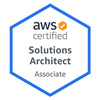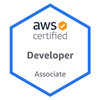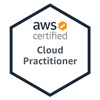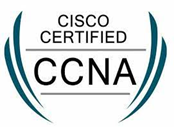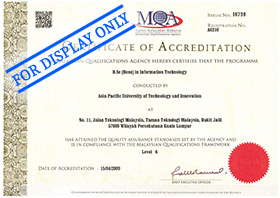You are here
Bachelor of Science (Honours) in Information Technology with a specialism in Cloud Engineering

|
|
|
APU-DMU DUAL DEGREE PROGRAMME |
MORE THAN JUST AN INFORMATION TECHNOLOGY DEGREE
APU's Bachelor of Science (Honours) in Information Technology with a specialism in Cloud Engineering degree is designed to provide you an edge with the latest technologies that are in line with the Industrial Revolution 4.0. |
ADMISSION REQUIREMENTS
GENERAL REQUIREMENTS | |
| DIRECT ENTRY TO LEVEL 1 OF THE DEGREE: | |
| STPM | • 2 Passes in STPM with minimum Grade C (GP 2.0) in any subject with a Credit in Mathematics at SPM. |
A-LEVEL | • 2 Passes in A-Level and with a Credit in Mathematics at SPM/ O-Level/ IGCSE or equivalent. |
| UEC | • 5 Grade B Passes in UEC in any subjects including Mathematics. |
FOUNDATION/ | • A pass in Matriculation or Foundation studies with minimum CGPA of 2.0 with a Credit in Mathematics at SPM/ IGCSE/ O-Level or its equivalent. Note: Candidates who have obtained a Pass in Mathematics, but do not have a Credit Pass in Mathematics at SPM/IGCSE or equivalent, need to take a Pre-Requisite Mathematics module prior or at the beginning of the study. |
OTHER DIPLOMAS | • Diploma in Science, Technology or Business studies with a minimum CGPA of 2.50 and with Credit in Mathematics at SPM/ IGCSE or its equivalent, can be admitted subject to rigorous assessment conducted by APU. |
| DIRECT ENTRY TO LEVEL 2 OF THE DEGREE: | |
| ICT RELATED DIPLOMAS | • Diploma in Computing related areas with a minimum CGPA of 2.50 and fulfilment of requirements for Credit Transfer is subject to approval by the APU Academic Board. Note: Student with CGPA above 2.0 and below 2.5 may be accepted using rigorous assessment conducted by APU and subject to the approval of the Academic Board. |
A qualification that APU accepts as equivalent to the above.
| ENGLISH REQUIREMENTS | |
INTERNATIONAL STUDENTS | • IELTS : 5.0 |
PROGRAMME OUTLINE
This programme is specifically designed to provide students with:
- An understanding of frameworks and planning techniques for the strategic management of cloud-based information systems in organisations.
- The ability to critically evaluate and apply cloud computing technologies, networking technologies and topologies, as well as the skills and expertise required for cloud-focused engineering roles.
- The skills and knowledge required to develop and assess network architectures and networked computing applications.
| DEGREE LEVEL 1 |
Students will learn fundamental skills required by every IT professional, and the basic understanding of the underlying computer system through computer architecture, operating systems, networks, and databases. Some specialized modules will provide students with basic knowledge of web design and development. The modules will also help them develop personal and organizational skills, as well as nurture creativity and innovation.
COMMON MODULES | |
|
|
SPECIALISED MODULES | |
| |
| DEGREE LEVEL 2 |
A broader range of skills will be learnt, in which students will gain a better understanding of frameworks and planning techniques for the strategic management of organization’s computing resources, along with technical skills to evaluate, design, configure and maintain shared computing infrastructure. They will gain solid understanding of the importance of enterprise systems and network administration in virtual computing environments. They will have programming skills needed in systems administration, network technologies, network design, and network security. We will further nurture their creativity and innovation as well as independent learning to prepare them for the workplace.
COMMON MODULES | |
|
|
SPECIALISED MODULES | |
|
|
| INTERNSHIP (16 weeks) |
Students will undertake an Internship/Industrial Training for a minimum period of 16 weeks to prepare them for a smooth transition from the classroom to the working environment.
| DEGREE LEVEL 3 |
Students will make use of their previous studies and industrial experience to extend their familiarity in the field of cloud computing and to refine their personal and professional development. Students will learn how to design and manage cloud-based systems in enterprises using programming skills, management, and planning strategies. Students will have a deeper understanding of enterprise network components, settings, and methodologies, as well as a better understanding of edge computing concepts and applications. A final year project requires them to investigate and develop a solution for a real-world problem - they will demonstrate their ability to combine technical knowledge, critical thinking, and analytical skills to produce a personal achievement portfolio.
COMMON MODULES | |
|
|
SPECIALISED MODULES | |
|
|
MQA COMPULSORY SUBJECTS* |
|
|
(*All students are required to successfully complete these modules as stipulated by the Malaysian Qualification Agency.) Note: The specialism will appear only in the academic transcript. | |
PROFESSIONAL CERTIFICATION PARTNERS
| | | |
Amazon Web Services (AWS) is the most widely used cloud platform in the world, offering a variety of fully featured services from data centers all over the world.
As an Amazon Web Services (AWS) Academy member institution, Asia Pacific University of Technology & Innovation offers the AWS Academy cloud computing curriculum that prepares students for industry-recognized certifications and in-demand cloud jobs. The AWS Academy curriculum is developed and maintained by AWS subject matter experts, and courses are taught by AWS Academy-accredited educators who are trained by AWS to help students become proficient in AWS technology.
The rapid rise of computing is creating a growing number of high-quality jobs at organizations around the world, and the technical skills that students develop through this program will position them well for their careers today and in the future.
CAREER OPTION WITH AWS ACADEMY MEMBER INSTITUTION |
|
|

FY 2020 cloud infrastructure service revenue $ 129 billion
CISCO CCNA CERTIFICATION
| |
Cisco is the worldwide leader in IT and networking. Achieving CISCO CCNA certification is the first step in preparing for a career in IT technologies. To earn CCNA certification, you pass one exam that covers a broad range of fundamentals for IT careers, based on the latest networking technologies, software development skills, and job roles.
The undergraduate APU students who enlist under this programme, will get an opportunity to get the CISCO CCNA certification which follows CCNA v7 prospectus. There are 4 modules under this programme that were designed following CCNA syllabus. This giving benefits to students as they have access to various resources and simulation software through the learning platform to facilitate their learning. As a CISCO Academy partner, APU had a dedicated CISCO lab with all CISCO devices. This facility is provided to ensure our students are exposed to the real physical configuration of network devices such as routers and switches in their lab sessions at level 2 and level 3 of their undergraduate program. With the best facility and skilled certified instructors, the students should be fully ready to sit for their CCNA certification exam during their final semester of undergraduate study.
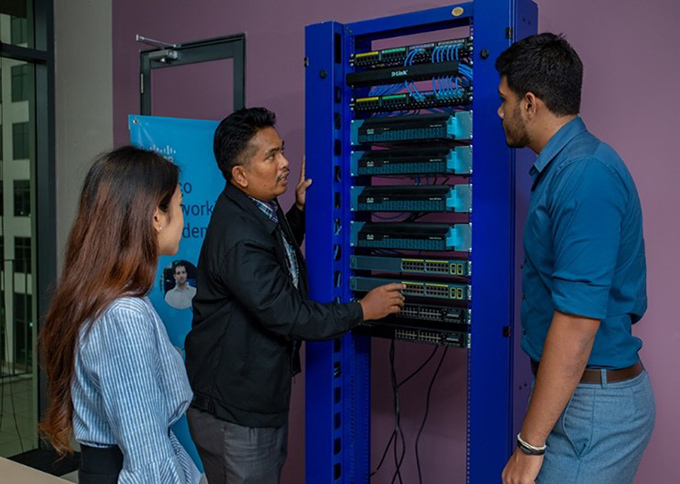
CAREER OPTIONS
|
|
COURSE FEES
Malaysian Students | International Students |
Year 1: RM 32,900 | Year 1: RM 33,600 (USD 7,815) |
* Fees stated here do not include Deposits and other Miscellaneous Fees. Please refer to Fee Guide for details.
MQA ACCREDITATION
(R3/0611/6/0038)(08/30)(A6210) |
Computing & Technology Degree Programmes |
- Bachelor of Science (Honours) in Information Technology
- Bachelor of Science (Honours) in Information Technology with a specialism in Information System Security
- Bachelor of Science (Honours) in Information Technology with a specialism in Internet of Things (IoT)
- Bachelor of Science (Honours) in Information Technology with a specialism in Digital Transformation
- Bachelor of Science (Honours) in Information Technology with a specialism in Financial Technology (FinTech)
- Bachelor of Science (Honours) in Information Technology with a specialism in Business Information Systems
- Bachelor of Science (Honours) in Information Technology with a specialism in Sustainable Computing
- Bachelor of Science (Hons) in Software Engineering
- Bachelor of Science (Honours) in Computer Science
- Bachelor of Science (Honours) in Computer Science with a specialism in Data Analytics
- Bachelor of Science (Honours) in Computer Science with a specialism in Digital Forensics
- Bachelor of Science (Honours) in Computer Science (Cyber Security)
- Bachelor of Computer Science (Hons) (Artificial Intelligence)




